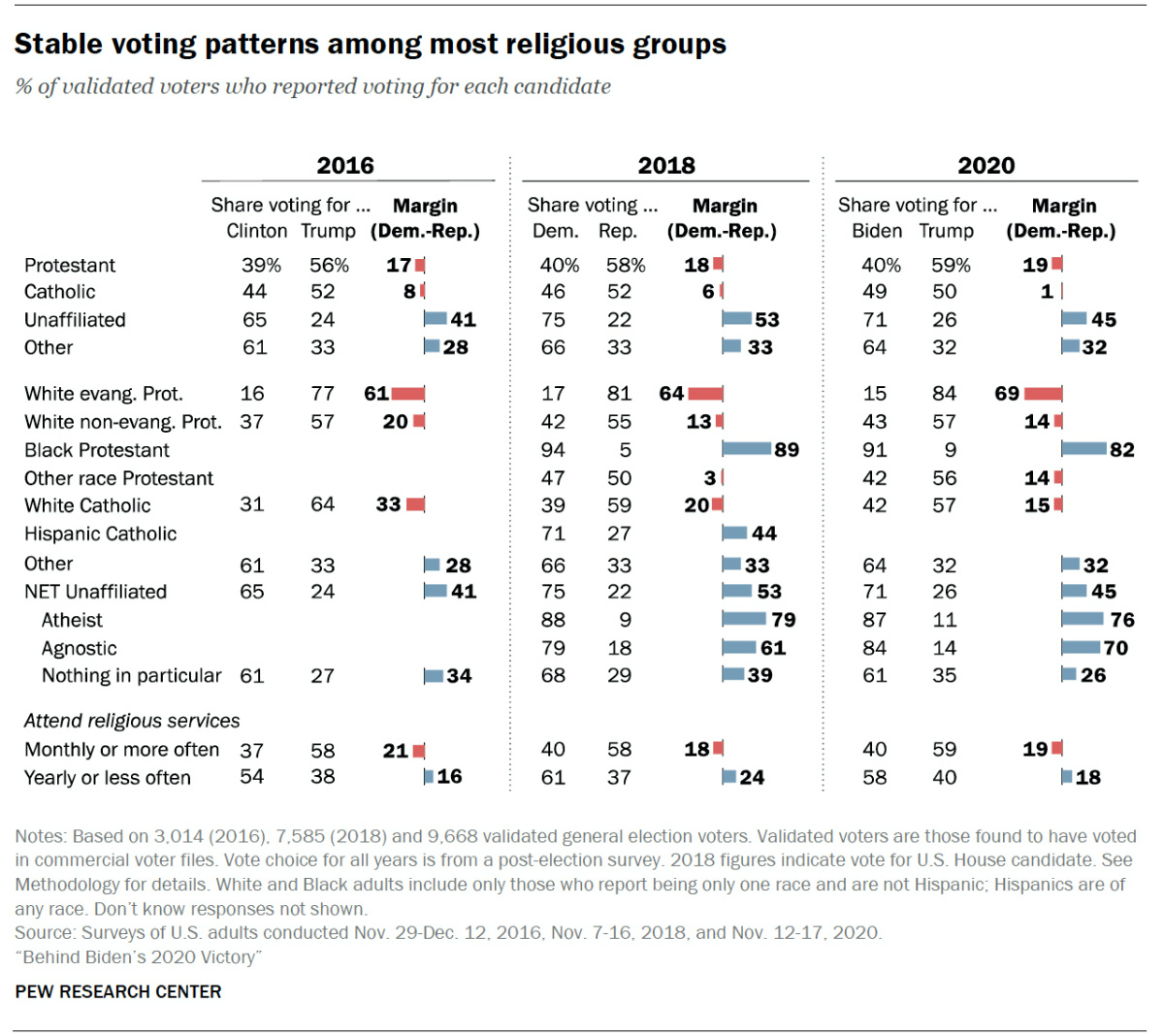Washington DC, US
RNS
A new survey reports former President Donald Trump expanded his robust support among white evangelicals in the 2020 election, but President Joe Biden won in part by making significant gains among Catholics and non-evangelical Protestants.
That’s according to Pew Research’s new “Behind Biden’s 2020 Victory” study unveiled on Wednesday. The findings, based on a survey of people confirmed by public records to have voted in 2020, showed that Trump was supported by 84 per cent of white evangelicals in 2020, an increase of seven percentage points over the 77 per cent of white evangelicals who voted for him in 2016.

Christ on the cross is seen at a polling station on the lower level of Our Lady of Lourdes Catholic Church, in Omaha, Nebraska, on 3rd November, 2020. PICTURE: AP Photo/Nati Harnik.
Trump, who launched his “Evangelicals for Trump” initiative in January, 2020, at a mostly Spanish-speaking church in Florida, also slightly increased his support among Protestant Christians overall, expanding his margin from 56 per cent in 2016 to 59 per cent last year.
But there is evidence Biden, who also ran an expansive faith outreach program during his campaign, chipped away at Trump’s religious coalition by making up ground with other faith groups.
Among Catholics overall, Biden – himself a Catholic – fought Trump to a stalemate. After Catholics backed Trump (52 per cent) over Hillary Clinton (44 per cent) in 2016, Biden managed to reduce the spread to a statistical tie, with 49 per cent supporting him compared to 50 per cent who said they voted for Trump.
Pew did not provide data to compare Hispanic Catholic votes in 2016 to 2020, but there are indications Biden courted favour among his fellow white Catholics – a powerful voting bloc in Rust Belt swing states. Whereas 31 per cent said they voted for Clinton in 2016, 42 per cent cast their ballots for Biden in 2020. Trump won the demographic in both elections (64 per cent in 2016 and 57 per cent in 2020), but a shift toward Biden cut the former president’s winning margin with the group by more than half.
There was also a notable – albeit less dramatic – movement among white, non-evangelical Protestants. Only 37 per cent of the group supported Clinton in 2016, with Trump securing 57 per cent of their vote that year. Trump won the same percentage last November, but Biden managed to convince 43 per cent of the group to back his campaign.
The shifts echo longstanding warnings from scholars and activists who pointed to cracks in Trump’s support among white Catholics and white non-evangelical Protestants as early as May, 2019. At the time, experts noted Trump’s favorability ratings were far more elastic with those groups than among white evangelicals, a reliable base for him even amid various scandals.

Stable voting patterns among most religious groups. GRAPHIC: Courtesy of Pew Research Center
Pew’s findings may also vindicate Democratic strategists who insisted on robust faith outreach efforts in the 2020 campaign. In addition to working to compile endorsements from faith leaders and dedicating an entire section of the 2020 Democratic National Convention to a discussion of his faith, Biden repeatedly invoked his Catholicism while on the campaign trail and spoke at various religious gatherings. In addition, both the DNC and the Biden campaign produced ads for television and digital platforms targeted at Catholic voters.
Biden also organised aggressive outreach to Black Protestants throughout his campaign and secured support from 91 per cent of the demographic by Election Day in 2020, according to Pew. The reports did not provide 2016 data on the group for comparison.
Researchers noted Biden also expanded Democratic support among a rapidly expanding subset of the American religious landscape: people who claim no religious affiliation whatsoever.
The group has long skewed heavily liberal, with Clinton winning 65 per cent of their votes compared to Trump’s 24 per cent in 2016. Trump fared slightly better with the group last year (26 per cent), but Biden boasted 71 per cent, drawing on heavy support from subsets such as atheists (87 per cent) and agnostics (84 per cent).
However, Trump appears to have made unexpected gains with another unaffiliated subset — namely, people who answer questions about religious affiliation by selecting “nothing in particular.” Biden won the same percentage of the group as Clinton (61 per cent), but Trump increased his support from 27 per cent in 2016 to 35 per cent in 2020.






